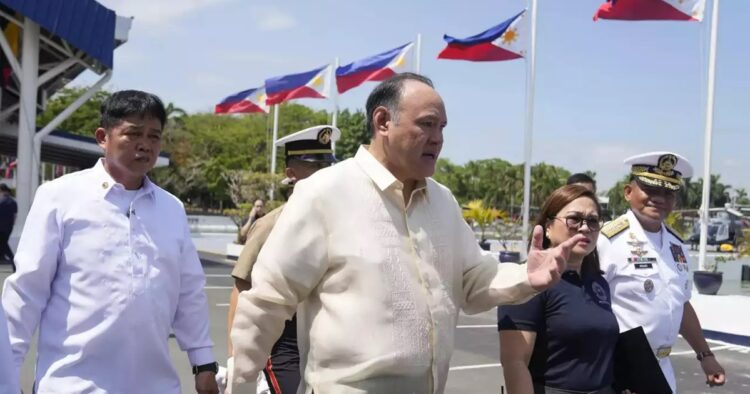Recently in an address, Defense Secretary Gilberto Teodoro affirmed the Philippines’ commitment to building security alliances and conducting joint combat drills in disputed waters.
Teodoro’s remarks came in response to criticisms from China regarding these activities, which he dismissed as unfounded paranoia. He boldly criticized what he termed as “increasingly aggressive actions” in the South China Sea, without explicitly naming China.
Highlighting the Philippines’ stance against aggression and provocative actions, Teodoro emphasized the country’s determination to safeguard its territorial interests.
Since tensions escalated last year in the South China Sea, President Ferdinand Marcos Jr.’s administration has actively sought new security alliances with various Asian and Western countries. This includes allowing a heightened US military presence in Philippine bases under a 2014 defense pact.
Noting, joint live-fire combat exercises with US forces have been conducted by the Philippine military in April and May, both in and around the disputed waters.
China has criticized such actions, labeling them as provocative and aimed at containing Beijing while jeopardizing regional security. However, Teodoro dismissed these claims, characterizing them as evidence of a closed political system’s paranoia.
ALSO WATCH: World Indian Warships Reach Philippines to Counter China’s Engagement in South China Sea
The Philippines, being the US’s oldest treaty ally in Asia, enjoys defense pacts allowing American and Australian forces to partake in annual combat-readiness and disaster-response training within its borders.
In addition, negotiations for a similar agreement with Japan are underway, while consideration is given to a pact with France. Joint maneuvers with the US, Australian, and Japanese navies have already occurred this year.
In a significant display of military strength, thousands of US and Philippine forces recently engaged in large-scale military exercises, simulating the retaking of an island and sinking a warship. These exercises, focused on territorial defense in the South China Sea, involved aerial reconnaissance, logistical transport drills, and securing an airfield during mock combat near Taiwan.
Despite China’s opposition to what it perceives as external interference and provocation in the South China Sea, Teodoro reiterated the Philippines’ commitment to defending its internationally recognized exclusive economic zone.
This stance, he emphasized, is not a provocation but a constitutional duty. Besides China and the Philippines, other nation’s like Vietnam, Malaysia, Brunei, and Taiwan are embroiled in territorial disputes in the South China Sea, a vital global trade route.
In light of escalating tensions, President Marcos has directed the military to shift its focus from domestic anti-insurgency operations to external defense. This realignment aligns with efforts by US President Joe Biden and his administration to bolster alliances in the Indo-Pacific region to counter China’s actions.
As the situation continues to evolve, the Philippines remains steadfast in its commitment to safeguarding its territorial integrity and promoting stability in the region.

















Comments